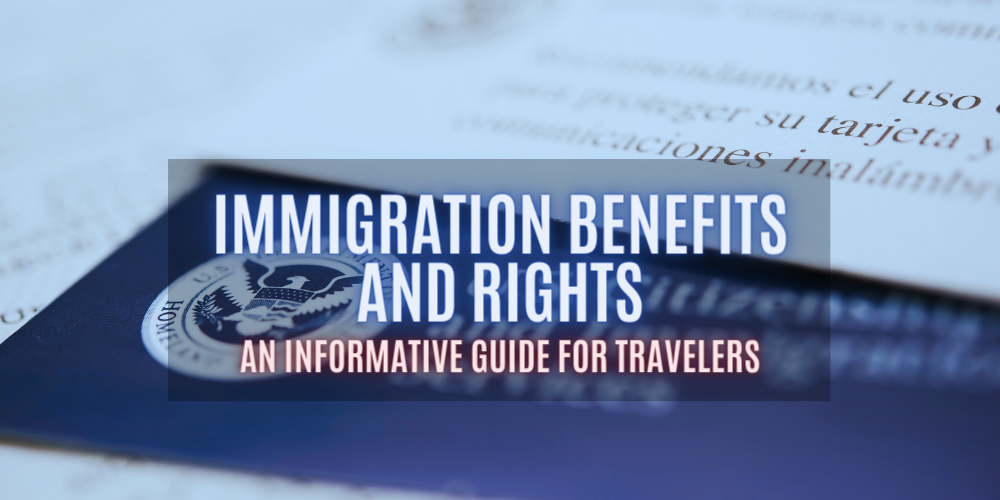--------- A Guide for Securing Citizenship for Your Foreign-Born Child Through Parental or Grandparental Legacy
May 8, 2024

Navigating the complexities of U.S. immigration laws can be daunting, especially when it involves the future of your children. For many travelers and expatriates, understanding how a foreign-born child can secure U.S. citizenship through a parent or grandparent is not just bureaucratic—it's personal. This guide is designed to simplify these complexities and provide you with a clear path to securing citizenship for your child.
Understanding U.S. Citizenship Laws
Citizenship refers to the legal status of a person recognized under the custom or law of a state that bestows on that person the rights and duties of citizenship. This includes the right to work, reside in the country, and vote. There are two main ways to obtain U.S. citizenship: by birthright on U.S. soil or through naturalization. Additionally, there is derivative citizenship, where children automatically acquire citizenship based on their parents' status, and automatic acquisition, where citizenship is granted to a child after birth under certain conditions.
The U.S. Citizenship and Immigration Services (USCIS) oversees these processes and sets the guidelines for how citizenship can be obtained.
Citizenship Through a U.S. Citizen Parent
Citizenship at Birth Abroad
If a child is born outside of the U.S. and one of the parents is a U.S. citizen at the time of birth, the child is typically entitled to U.S. citizenship. The key requirements include:
- Parental citizenship: One parent must be a U.S. citizen when the child is born.
- Physical presence: The U.S. citizen parent must have lived in the U.S. for a specific period before the child's birth, usually totaling at least five years, with at least two of those years after the age of 14.
Citizenship After Birth
Children who do not automatically acquire citizenship at birth may still become citizens before the age of 18 through derivative citizenship. This process generally requires the child to be residing in the U.S. under the legal and physical custody of the U.S. citizen parent following lawful admission for permanent residence.
The Role of Grandparents in Derivative Citizenship
In special circumstances, a U.S. citizen grandparent can also play a role in helping a child derive citizenship. This usually comes into play if the U.S. citizen parent cannot meet the physical presence requirement in the U.S. before the child’s birth. In these cases, the physical presence of the U.S. citizen grandparent in the U.S. can be counted towards the requirement.
Step-by-Step Guide to Applying for Citizenship
Navigating the application process for your child’s citizenship involves several critical steps:
- Gather Documentation: Birth certificates, proof of parental citizenship, proof of residence in the U.S., and other legal documents must be collected.
- Application Process: Submit the necessary forms (typically Form N-600, Application for Certificate of Citizenship) to USCIS, along with the required fees.
- Timeline: Processing times can vary, so it’s crucial to apply well in advance of when the citizenship status is needed for schooling or travel.
Legal Considerations and Challenges
It's common to encounter legal hurdles throughout this process. These might include documentation issues, proving physical presence, or navigating the legal system in cases of adoption or divorce. Consulting with an immigration attorney can provide guidance tailored to your specific situation.
Additional Resources
For more detailed information, visit the USCIS website or consult trusted immigration attorneys and legal aid organizations that specialize in citizenship matters.
Securing U.S. citizenship for a foreign-born child through a parent or grandparent can open doors to a host of opportunities and provide security and stability for your family. While the process may seem overwhelming, understanding your rights and the necessary steps can demystify the path to citizenship.
Remember, each case is unique, so it’s important to seek personalized advice from legal professionals. This will ensure that you’re making the best decisions for your family’s future.
Recent Articles

Immigration Benefits and Rights: An Informative Guide for Travelers
Understanding immigration benefits and rights is essential for anyone considering travel or relocati

SEVIS Simplified: A Complete Guide for International Students and Exchange Visitors
If you're planning to study or participate in an exchange program in the United States, understandin

Understanding ICE: Navigating the Role of Immigration and Customs Enforcement in the U.S.
Immigration and Customs Enforcement (ICE) plays a pivotal role in the U.S. immigration system. As tr

Investing in the American Dream: A Comprehensive Guide to the EB-5 Immigrant Investor Program
The EB-5 Immigrant Investor Program offers a unique pathway to U.S. residency for foreign investors

Finding Safety: A Traveler's Guide to Understanding Refugees and Asylum
Refugees and asylum seekers are central figures in the global discussion on immigration and human ri

Navigating Optional Practical Training: A Guide for International Students
Embarking on an educational journey to the U.S. opens up a world of opportunities, not just for acad
Read More

Immigration Benefits and Rights: An Informative Guide for Travelers

SEVIS Simplified: A Complete Guide for International Students and Exchange Visitors

Understanding ICE: Navigating the Role of Immigration and Customs Enforcement in the U.S.

Investing in the American Dream: A Comprehensive Guide to the EB-5 Immigrant Investor Program

Finding Safety: A Traveler's Guide to Understanding Refugees and Asylum

Navigating Optional Practical Training: A Guide for International Students

Welcome to the GovAssist blog. We know that navigating the maze of visa applications and online forms can be as tricky as choosing the perfect travel playlist (which is all we want you worrying about anyway).
Throughout our years of experience, though, we’ve uncovered a mountain of knowledge which, via this blog, we’re sharing with you! Whether you're diving into the world of travel visas, wondering about the ESTA online hustle, or just trying to figure out the DS160 form, think of us as your online concierge, here to make the process easy and most of all, clear.
At this point in our global context, who has time for endless paperwork and confusing legal jargon? No one. That's why we're all about spilling the tea on online visa hacks, easier-to-work-with DS160 forms, and giving you tips on everything from tourist visas to immigration, to that last-minute ESTA online adventure.
So, just plug in a word you’re curious about on the search bar, and boom. We've got the tips, tricks, and insider info to help you (and anyone else you may be traveling with) get to your travel destination with the confidence of a seasoned traveler.
Now go explore!
